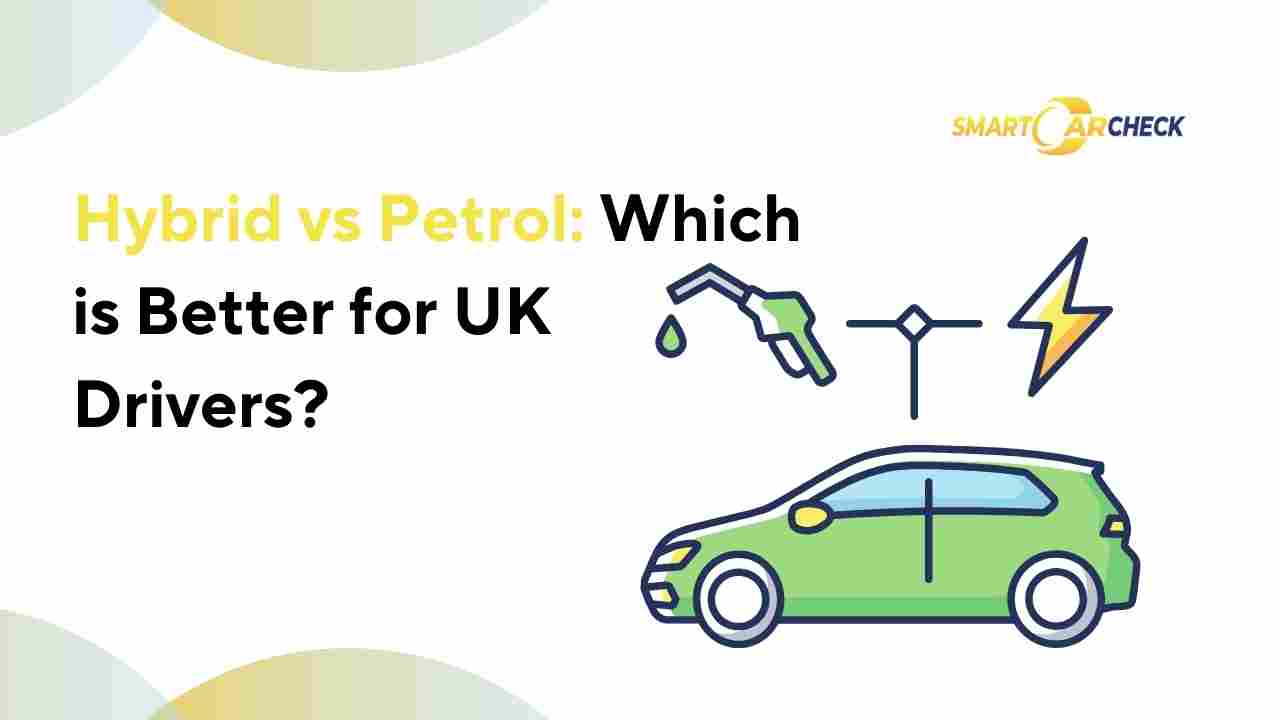Deciding between a hybrid and a petrol car can be a tough choice. Rising fuel costs and stricter emissions regulations leave many UK drivers wondering which option is best. The decision becomes even trickier if concerns about maintenance and long-term value are added.
Understanding the pros and cons of each type can help you make the right call. Our car reg check tool offers detailed vehicle history and insights when considering a second-hand car, so you’ll feel confident about your choice.
RELATED: Diesel vs Petrol: Which Car Type is Right for You? [2024]
What to Consider When Choosing Between Hybrid and Petrol Cars
When choosing between hybrid and petrol vehicles, consider fuel costs, emissions, and how and where you drive.
UK drivers face unique challenges like Clean Air Zones (CAZs), higher fuel prices, and congestion charges. Each vehicle type has its strengths and weaknesses, so the best choice depends on your needs and budget.
Benefits of Driving a Hybrid Car
Lower Emissions
Hybrid cars produce fewer greenhouse gases than petrol vehicles, especially in urban areas. Their ability to switch to electric power for short distances reduces tailpipe emissions significantly. In UK Clean Air Zones, hybrids can save you from hefty daily charges, making them an excellent choice for city drivers.
Fuel Efficiency
Hybrids shine in stop-start traffic, where their electric motor reduces fuel consumption. If you check mpg using its registration number, a hybrid like the Toyota Prius can offer over 60 mpg in urban driving. This efficiency translates to fewer trips to the pump and lower monthly expenses.
Quieter Drive
The electric motor in a hybrid ensures a quieter, smoother driving experience. You’ll notice the difference in heavy traffic or while cruising at low speeds. This calm, peaceful ride can make commuting far less stressful.
Tax Benefits
Hybrid vehicles often fall into lower road tax bands due to reduced CO2 emissions. Some models even qualify for exemptions in congestion zones, saving you money in the long run.
RELATED: The Top 10 Most Fuel-Efficient Cars in the UK (Expert Analysis)
Advantages of Petrol Cars
Lower Upfront Costs
Petrol cars typically have a lower purchase price than hybrids. For drivers on a budget, they offer an affordable way to access reliable transport without stretching finances too thin.
Fuel Availability and Convenience
Petrol stations remain more widespread than EV charging points, particularly in rural areas. Petrol refueling is faster; you don’t need to worry about battery range or charging downtime.
High-Performance Options
Petrol engines still dominate the performance car market. If you enjoy a sporty drive, you’ll find plenty of powerful petrol options that deliver thrills on UK roads.
Proven Reliability
Petrol engines have been around longer, with a well-established track record. They tend to be simpler to maintain and repair than hybrids, making them a cost-effective choice for long-term ownership.
RELATED: How Big Is My Petrol Tank? Here’s The Best Way To Find Out
Key Differences in Fuel Economy and Cost Efficiency
Fuel economy plays a critical role in this debate. Hybrids generally win here, particularly in urban environments. For example, a hybrid car like the Honda Jazz can achieve up to 70 mpg in mixed driving. Petrol vehicles, while improving, often struggle to match these numbers in city conditions.
However, the picture changes to show motorway driving. Petrol cars often perform more efficiently at constant high speeds. Hybrid systems can lose their edge on long-distance routes where electric contributions decrease.
When it comes to maintenance, hybrids can cost more. Their dual systems (engine and electric motor) are complex, leading to potentially higher repair bills. On the other hand, petrol cars benefit from lower service costs and easier access to parts.
Environmental Impact: Hybrid vs Petrol
Hybrids offer a clear environmental advantage in reducing CO2 emissions. Many UK cities have introduced Clean Air Zones, and hybrids are less likely to face charges or restrictions in these areas. For eco-conscious drivers, hybrids align with goals to reduce environmental impact.
Petrol cars, however, lag in emissions. While modern petrol engines are cleaner than older models, they still produce more pollutants than hybrids. This may be less of a concern if your driving is mainly rural or on motorways.
How Smart Car Check Can Help You Choose
Understanding the finer details of a car can make all the difference. With our Car Check by Reg tool, you get access to essential information like:
- Mileage History: Verify the accuracy of odometer readings to avoid fraud.
- Emission Reports: Assess how eco-friendly your potential car is, helping you avoid high CAZ charges.
- Vehicle Background: Check accident history, ownership changes, and more to ensure peace of mind.
Before committing to a hybrid or petrol vehicle, use this tool to make an informed choice that fits your driving habits and budget.
Conclusion
Both hybrid and petrol cars have their place on UK roads. If you’re seeking lower emissions, better fuel efficiency, and an eco-friendly choice for city driving, a hybrid might be your best bet. However, if you prioritize upfront savings, convenience, and long-term reliability, petrol cars remain a solid option.
Frequently Asked Questions
Is it cheaper to run a hybrid or a petrol car?
Hybrids generally cost less in fuel and offer savings in congestion zones. Petrol cars may have lower upfront costs and maintenance expenses.
Do hybrids last as long as petrol cars?
Yes, hybrids can last as long as petrol cars if properly maintained. Their electric components are designed to be durable.
Are hybrids better for city or motorway driving?
Hybrids excel in city driving due to stop-start traffic efficiency. Petrol cars may perform better for consistent, long motorway journeys.


